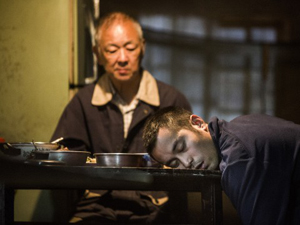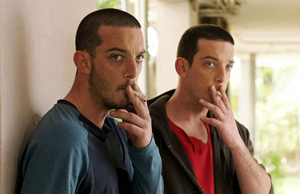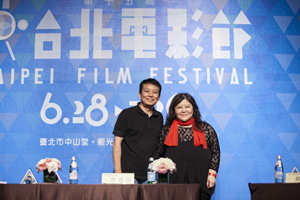Expect a kaleidoscope at the 2013 Taipei Film Festival
By Gloria Cho So does the Taipei Film Festival (TFF). Dedicated to encourage budding directors and a platform for outstanding films under various themes, this year's edition continues to offer new territory for local audiences to explore. City in focus: Istanbul There are over 100 films, including 20 some films featuring Istanbul, the City in Focus this year, which lend local audiences a peek into the city that spans Asia and Europe. Two categories are prepared under the umbrella theme: Contemporary Auteurs and Contemporary new Voices. The "Contemporary Auteurs" category features significant works in modern Turkey, including Somersault in a Coffin by Derviş Zaim. Starting from an experimental genre, and then moving to documentaries, Zaim presented his feature length debut in 1996. The film involves vagrant issues and reveals a mood of frustration with authority. It is also a representative work of New Wave Cinema in Turkey. A series of Yeşim Ustaoğlu's films, including her blockbuster debut The Trace, Journey to the Sun, and most recently, Araf-Somewhere in Between, are highlighted among all. As the most internationally renowned female director in Turkey after 1990s, Ustaoğlu's poetic images, and delicate affections, resonate with the viewers with a wide range of themes. Ali Aydin's Mold relates to a mid-aged man whose thoughts are always pre-occupied with with finding his son. Having been missing for 18 years, the heartbroken father constantly writes letters to the Ministry of Interior Affairs and the Police Headquarters, which has caused him severely tortured, interrogated, and isolated. This film is sad to ironically depict the political suppression in a set of poetic images. Budding directors' stage A highlight among all is the International New Talent Competition, a contest Heroine Shirili Deshe Paula received the award in behalf of Shoval, saying this would be a great encouragement for the starting director. The Poland film won as the jury considers that there was no, 'cheap sympathy or skirting the surface of its story, this work has an astonishing ending that shows the conflicts in the relation between youth and fashion,' according to the comments by the jury. Call Girl by Mikael Marcimain defeated the Netherland film Matterhorn and the Polish film Loving, narrowly winning the Audience's Choice Award. Producer Mimi Spang expressed gratitude upon receiving the award and said that she couldn't believe audiences favored this long and dark film. This remarkable film brilliantly reproduces the decadent 1970s. Call Girl recounts a true story of teen prostitutes for some of Sweden's most magnificent figures. Renowned Chinese director and producer, Huang Jianxin, chaired the jury, and the jury members include Aditya ASSARAT from Thailand, Kiki SUGINO from Japan, Yesim USTAOGLU from Turkey, and WEN Tien-Hsiang from Taiwan. The overall 12 films presented by international young directors showcase a wide variety of styles. "This group of budding directors' responsibility to delve into various issues relating to society and humanity is fully showed through their films," said Jury Head Huang. "TFF is young and simple that allow filmmakers a venue to exchange," said Huang. He also expressed expectation that the TFF would continue to connect with the uniqueness and versatility of new talents. Chinese movie market foresees prosperity "A more complete and thoroughly departmental system should be built for the filmmaking industry," said Jiao Xiong-ping, senior film producer in Taiwan, upon asked in a seminar held on July 3rd in Taipei. Film producers are supposed to shoulder the task from the earliest conception to the final marketing part, she said. "Producers should replace directors to act as the soul of a film," suggested Jiao, who's widely known as godmother of Taiwanese cinema. Huang agreed with his counterpart from across the Taiwan Strait by saying that, "professional producers should help with things other than creation." "Specific division of labor helps comprehensive planning of the entire shooting process and well prepares the director for the filming job." Both of them affirmed that now is the best era for Chinese filmmakers, saying the two sides across the strait should cooperate more to create commercial potentials. British newspaper The Guardian has forecasted that the rapid growth of China's film market would fuel it to replace the US as the world's largest in 2018. Huang pointed out that the box office in China has reached ten billion RMB as of the upper half of 2013 and would expect 22 billion RMB in total this year. The number of silver screens in China has come in at 15 thousand so far and is estimated to outnumber the 30 thousand of the US in 2018 as world's largest film market, cited Huang according to the Guardian's reports. Keen observers as they are, the two veterans in the industry also believe an era for young directors has come in China as several feature lengths invoking memories of a time such as actor and director Vicky Zhao's A tribute to our eventually lost youth, and Tiny Times, whereas several costume films with huge investment slipped in the box office recently. The former emphasizes in congregating specialists from Taiwan and China to venture into the global market with widely accepted themes, and thus to compete on equal terms with Hollywood. The latter, on the other hand, focuses on local identification and targets specific markets to ensure profits from local markets. "Touch of the Light, for instance, has won tremendous positive opinions in China as it conveys rich Taiwanese affection despite the screening schedule had been narrowed down by blockbuster Switch," pointed out Jiao. When it comes to a global scale, they both agree that filmmakers in the Chinese-speaking circle should be dedicated to genre movies to improve competitiveness. "Audiences born after 1990 step into theater for audio-visual satisfaction," said director Huang. "Watching movies is a lifestyle and social life for young people in China," said Huang, "and criticize lousy films together can be a fashion."
Staff Writer Visual effects, innovative ideas, boundless creativity, and wild imagination can all find their best interpretation through a common means—film. The big screen offers human beings not only a way to express themselves but also a channel to explore the most unspoken and untold stories.
Visual effects, innovative ideas, boundless creativity, and wild imagination can all find their best interpretation through a common means—film. The big screen offers human beings not only a way to express themselves but also a channel to explore the most unspoken and untold stories. In the Contemporary new Voices category presents a careful selection of films. Suspense thriller The Pomegranate delves into an actress who pretends to be someone else with a shadow of threatening developments as the plots unfold.
In the Contemporary new Voices category presents a careful selection of films. Suspense thriller The Pomegranate delves into an actress who pretends to be someone else with a shadow of threatening developments as the plots unfold.
devoted to discover rising stars in the industry. The Grand Prize went to Israeli director Tom Shoval's Youth along with a cash award of NT$600,000.
Youth is about two brothers who plan a kidnap of a wealthy girl for a huge ransom when the elder is on a tour of military duty. The film won the title through its successful portrayal of sorrow with flashes of humor. It illustrates not only the unique face of life in Israel but also a deep observation of humanity that is universal, according to the juries. Special Jury Prize was given to Baby Blues with a cash award of NT$300,000 for director Kasia Rosłaniec. It relates the story of a 17-year old girl who tries to raise a baby. Yet the teen is constantly distracted by videogames, drugs, and alcohol; she is hardly compatible to child raising.
Special Jury Prize was given to Baby Blues with a cash award of NT$300,000 for director Kasia Rosłaniec. It relates the story of a 17-year old girl who tries to raise a baby. Yet the teen is constantly distracted by videogames, drugs, and alcohol; she is hardly compatible to child raising.  Cohosting with renowned Chinese director and producer, Huang Jianxin, the talk focused on, "How to seize the initiatives and commercial potential of Chinese language cinema market". The two masters shared their keen observation toward current film market, production experiences, and global trend as well.
Cohosting with renowned Chinese director and producer, Huang Jianxin, the talk focused on, "How to seize the initiatives and commercial potential of Chinese language cinema market". The two masters shared their keen observation toward current film market, production experiences, and global trend as well. This phenomenon has inspired advice for budding directors: one is to join the great Chinese-speaking circle and the second is to take root in local market as they adopt a creative approach.
This phenomenon has inspired advice for budding directors: one is to join the great Chinese-speaking circle and the second is to take root in local market as they adopt a creative approach.
Other programs still include a selection of restored classics; a selective of works by French master Pierre Étaix, and more.

![Taiwan.gov.tw [ open a new window]](/images/egov.png)
